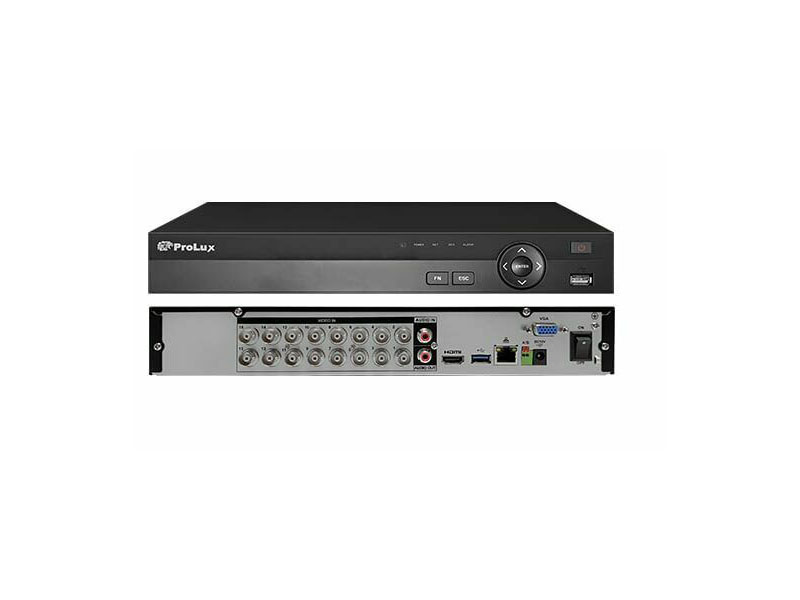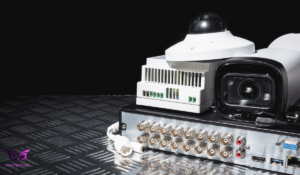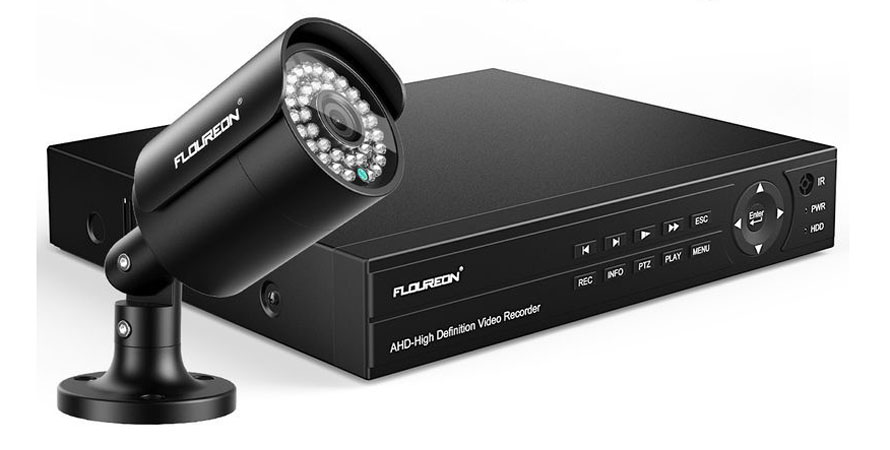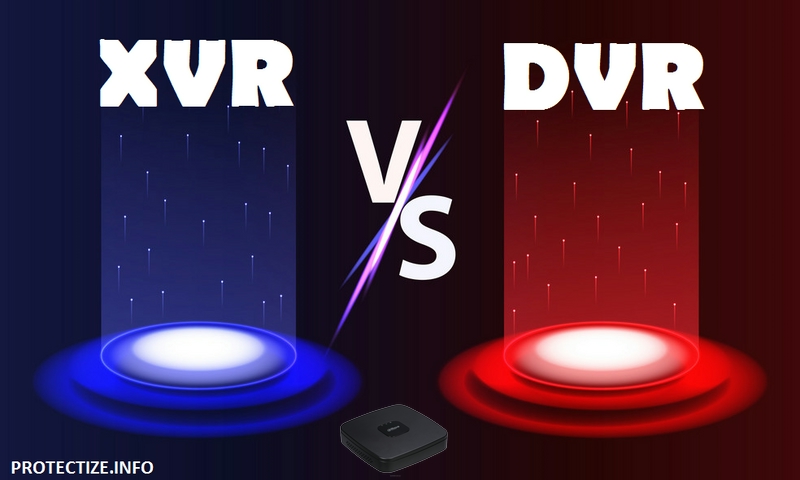Let’s say the XVR recorder is somewhere between the XVR vs DVR UK. It combines the functions of both of these types of CCTV recorders.
A digital video recorder (DVR) is a device used to process and record analogue HD CCTV cameras called HD coaxial cameras, which include HD-TVI, HD-CVI, and AHD cameras. NVR (Network Video Recorder) is a device used for IP security cameras.
Meanwhile, the XVR is a device capable of handling and recording both HD over coax and IP security cameras. In other words, the XVR recorder is a hybrid of a DVR and an NVR.
NVR is still the best choice for most installations or projects that use all IP cameras, but XVRs can come in handy if you need to upgrade existing security cameras and add more analogue HD cameras or IP cameras.
The main difference between XVR vs DVR UK is that most XVRs can support all common CCTV video formats such as classic analogue cameras, TVI, CVI, AHD, and IP cameras with different resolutions like 2MP or 4MP (depending on the model and characteristics of XVR). This makes the XRV compatible with the vast majority of CCTV cameras regardless of the manufacturer.

Table of Contents
ToggleWhat is the DVR Recorder?
The main components of the DVR Recorder include a processor, analogue-to-digital converter, control board, and other components. The device is controlled using the operating system.
There are the following types of DVR cameras:
- Network video recorder designed to work with IP video cameras.
- Hybrid recorder (compatible with analogue and digital cameras).
- Video recorder based on a personal computer.
- Recorders are used only for working with analogue cameras.
- A recording device designed for installation on vehicles (cars, boats, etc.).
Modern DVRs can be connected to computer networks. Devices for video recording are characterized by the number of input channels, resolution, type of compression used, and other parameters. The DVR Recorder can be connected to IP cameras and various external peripherals.
DVRs Manufacturers
We all know what video surveillance is. It is a camera that is installed in various places to monitor activities taking place in a particular area. However, CCTV is part of a larger system that is visible to people outside.
Various parts are hidden from the public, to which the entire video surveillance system of a particular place is connected.
If we think about it, this is a logical answer, but still, most people do not realize it. One of them is the display screen, which shows a live stream of cameras, and this is something that most people are aware of again.
The elusive parts that most people don’t see are called CCTV DVRs. They do exactly what the name suggests. They allow you to record actions captured on cameras.
While both are essentially involved in the recording, the procedure is very different. Below are the differences between XVR vs DVR UK:
Digital Video Recorder (DVR)
The abbreviation DVR Recorder stands for Digital Video Recorder. This device is used to record, store, and playback colour and monochrome video streams.
The signal is transmitted to the recorder via cables connected to cameras. The received data is converted into graphic information, which is compressed using a special algorithm. Further, the video stream is recorded on a digital medium.
DVRs are used with analogue cameras. This is the main area of cost savings in this system. DVR Recorder systems transmit the signal to the recorder, where the images are processed.
The cost of DVR systems is lower than that of NVR systems due to the outdated technology. Also, the type of cameras that can be used is smaller than NVR.
They use BNC coaxial cable, which is old technology again and does not provide power to the camera at the same time.
Therefore, 2 wires are required to start the system. In addition, the cables are thick and not flexible, which also creates other problems. At longer ranges, the coaxial cable signal begins to degrade, which affects the image quality.
Video monitoring has been working in the UK for many years. It is especially readily used in public places: offices, shops, supermarkets, or companies.
It allows you to check what is happening in the surveillance area. In addition, it can warn of fire or unauthorized access. It is enough just to interface with the fire system and access control systems.
The IP camera works based on the Internet Protocol (IP). It looks just like a regular webcam that connects to a computer via a USB port. The differences between XVR vs DVR UK, however, are very large.
The IP camera provides a live broadcast to the network so that its recording can be viewed through a browser.
The corresponding page can be found at the special internet address assigned to the camera. Thus, it is possible to control the observation area both from a computer and using mobile devices: a smartphone, or a tablet, for instance you watch Hikvision CCTV on the phone.
IP cameras are primarily used to monitor places and protect against burglary, theft, fire, flooding, or other threats that need to be quickly responded to.
Cameras of this type are used in offices, banks, firms, schools, and urban areas like parking lots, railway crossings, or intersections.
They enable you to watch live what is happening in a given place and to react quickly (for example, calling for security guards or technical personnel). They also allow the subsequent use of the stored records as evidence.
Cameras are also increasingly being installed in private homes. You can control the surroundings of your home (for example, a car in a parking lot or a garage, a gate at the entrance to a courtyard, or outbuildings), as well as an interior.
You will be able to make sure that your child is back from school and is doing their homework instead of sitting in front of the computer.

How to choose an IP camera?
Check what characteristics of the IP camera determine its functionality. The Angle of view – this determines how much area the webcam can “cover with a look”.
Resolution – it is determined primarily by the purpose of the camera. If a facial recognition system or automatic number-plate recognition is required, then the camera must have a high resolution.
The light sensitivity of the lens or additional external lighting (for example, using IR LEDs) is very important when recording an image in a dimly lit place or at night.
Built-in motion sensor, intelligent motion detection – this way the image is recorded only when needed. In addition, you send an email notification when a motion is detected, in which you will receive a photo from surveillance cameras. Here are other significant specifications of an IP camera.
Choose IP Camera
Method of connecting to the network – in the case of Wi-Fi, it is good if it is in the higher standard 802.11n or 802.11ac. Connecting the camera to the network using an Ethernet cable also works well. It gives you the confidence to have a stable connection and support high image resolutions.
Recording capability – you can choose different storage media: memory cards or NAS network drives.
The ability to connect additional sensors and alarm devices – expands the camera’s functionality. Thanks to this, a signal will be triggered if necessary, which will scare away the uninvited guest.
Possibility of remote control of the lens, which is very convenient when you need to see the area of observation you are interested in at the moment.
The built-in microphone and speaker is a very useful option that allows two-way communication. You can see what is happening and you can react: calm the dog down, say “Good night” to your child when he is under the supervision of someone else, or warn your grandfather about the danger.
Resistance to harsh weather conditions is a very important issue if you are looking for cameras for outdoor use. You can look for the best outdoor wireless CCTV camera system as well.
What is XVR used for?
XVR is an extended video recording that redefines the boundaries of video recording. This advanced security solution integrates a variety of cameras including, HD cameras, Analogue cameras, and IP cameras ( internet protocol) managing different recourses from a centralized platform.
XVR is a hybrid video recorder that integrates the most prominent features of digital and analogue cameras offering functionality and flexibility in a centralized hub. This can be a solution for those who want to benefit from high-resolution video recording and don’t find it affordable to change the whole security system. XVR works based on converting analog video signals to digital signals and processing the digital signals received from IP cameras. In addition, this also can manage video storage by utilizing compression techniques.
XVR camera system consists of several components including a camera, XVR units, storage, and cables.

Compare XVR vs DVR UK
1. XVR vs DVR UK installation
XVR Vs DVR UK – Suppose you are installing a CCTV system and your client uses old analogue or HD cameras. In that case, deploying XVR will provide more options without having to replace existing devices.
Let’s say a construction site system consists of an 8-channel DVR and 8 HD 1080p cameras, and we assume that you need to add a dedicated high-definition IP camera. If you have a DVR, you cannot do this, or you need to replace the recorder, which increases the cost. If you are using an XVR recorder, you can easily add an IP camera over the network and it will be supported by the recorder.
In addition, your clients may be frightened if you offer them to change the registrar and cameras, it will be too expensive for them. Just specify the XVR recorder, you can use existing cameras and add any other special cameras like narrow IP cameras or even HD high definition over coax cameras.
2. Compatibility with cameras
XVR Vs DVR UK– What’s more, if you are an installer, you can earn the customer’s trust by offering XVR as it supports all HD over coaxial cameras, including IP cameras. Let’s be honest in saying that IP cameras sound better for the layman than the coaxial camera offering. While, DVR merely supports analog cameras
3. Reduces the cost of installing video surveillance
XVR Vs DVR UK – With an XVR recorder, you can offer more at an affordable price. This is because you can mix existing cameras, add additional HD cameras over coax, which are still cheap, and add any IP cameras you need.
A video surveillance system becomes relatively expensive if you use an NVR and all IP cameras, and this can scare your customers away. In general, the XVR video surveillance system is cheaper compared to an NVR and at almost the same price as a DVR system (plus flexibility). After connecting the monitor, the user will be able to watch the processed video file. The information can also be viewed via a remote communication channel.
The recorder is used for video surveillance at the following facilities:
- Private houses
- Offices
- The shops
- Parking
- Checkpoint
- Gas station
- Industrial enterprises, etc.
DVR cameras are used in stationary and mobile video surveillance systems which is the primary difference between XVR vs DVR UK.
4. Remote access
XVR Vs DVR UK– XVR security systems offer advanced remote access, allowing users to monitor their premises from everywhere via their mobile phone app or web interfaces. While DVRs have basic remote access with much fewer features.
5. Hybrid feature
XVR Vs DVR UK– What’s more, XVR offer a seamless transition from analogue cameras to modern and high-resolution IP cameras without the need for replacement of the whole dated system. Conversely, DVRs are not that flexible to be adapted with other cameras other than analog cameras which makes it less practical in comparison to XVRs.
6. Multi-channel support
XVR Vs DVR UK– When it comes to large-scale surveillance XVRs are the best, as they can be used for large-scale security monitoring with several cameras, however, DVRs are great security system options for large-scale areas with only the installation of one camera.
7. Video quality
XVR Vs DVR UK– XVRs process the data in a way that provides high-quality video footage with DH format, as it is compatible with HD cameras. Compared to the DVRs that are limited to analog cameras with the lower video quality.
8. Installation cost
XVR Vs DVR UK– XVR installation cost is slightly higher due to the hybrid feature in comparison to DVR installation costs which are limited to the analog systems.
9. Format
XVR Vs DVR UK– XVR covers a variety of video formats, including HD-TVI, HD-CVI, AHD, CVBS, while DVR is limited to analog camera system with CVBS format.
10. Capacity
XVR Vs DVR UK– XVR supports H.265 compression providing more space storage, while DVR uses H.264 compression.
Which is better XVR or DVR?
XVR Vs DVR UK – The DVR usually supports certain types of video formats such as CVBS and TVI or CVBS and CVI, while the newer XVR models support all well-known CCTV video formats such as CVBS, TVI, CVI, AHD, and a range of IP cameras.
However, some common DVR models support all video formats except IP cameras. Technically, such voice recorders are called hybrid and tribrid. However, the main difference between XVR and DVR is to support an IP camera as well, it is called penta-brid.
XVR Vs DVR UK – Regarding prices, XVR is more expensive than DVR due to its hybrid feature for future upgrades and also covering various types of video formatting, compared to the DVRs that are cheaper because of their basic functionality supporting only analog systems and not varied formats.
If you prioritize functionality and have a vision to upgrade the security cameras, we recommend using XVRs as they provide a lot of flexibility. If you want to add an IP camera, you buy, install, and add it to the XVR over the network. Furthermore, XVRs offer higher-resolution video recording and hybrid functionality that enable users to upgrade their system to a more modern and flexible one without a complete replacement. Besides, It covers various formats of HD-TVI, HD-CVI, AHD, and CVBS which makes it even more functional with a larger storage capacity.
However, if you are on budget and budget constraints make primary concerns for you I will recommend DVRs due to their affordability and basic functions that make the installation process even cheaper. Generally, DVRs tend to be more affordable, meanwhile, they provide features like surveillance of large-scale areas with only one camera also they do not rely on an internet connection to record and store videos which is why they are still popular security systems.
Conclusion
In this article, we talked about the XVR and explained what kind of device it is. In a nutshell, it is a hybrid DVR Recorder offering more installation flexibility and a lower cost.
Using XVR will save you from the restrictions on the parameters of the CCTV camera in the future. Whether you are an end-user or installing it for a customer, you can rest assured that your video surveillance system can be easily scaled up for future expansions.


d